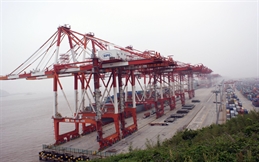
Non-mainland Chinese carriers, notably A.P. Moller-Maersk (Maersk) and Orient Overseas Container Line (OOCL) have been granted official access to four vital Chinese coastal shipping routes within the country as part of efforts to ease congestion in certain Chinese ports.
Chinese state media said both Maersk and OOCL are planning their first voyages utilizing the said system by the end of May.
"China has freed up the coastal piggyback system for shipping of foreign trade containers between ports within China," China's state council said in a statement.
Zhou Zhicheng, a researcher at the Beijing-based China Federation of Logistics and Purchasing, was quoted as saying that the move will help ease bottlenecks in Chinese ports currently experiencing volume surges.
"The new service (for shipping of foreign trade containers between ports within China) is expected to help cut the logistics costs for both exporters and importers, improve the utilization rates of container ships, and relieve the tightness of shipping capacity to a certain extent," Zhicheng said.
Jens Eskelund, China chief representative of Maersk, said the permission for foreign carriers to carry out international relay is "very welcome news" and represents a tangible step for foreign carriers in China toward achieving market access on reciprocal terms.
"International relay will allow us to improve services, giving our customers more flexibility and options for their shipments. We are preparing the first shipment in Yangshan terminal in Shanghai, together with the Lin-gang Special Area Administration and other relevant stakeholders," Eskelund said.
China's state council noted that Hong Kong-based Asia Shipping Certification Services Co Ltd. has been officially approved to carry out statutory ship inspection work in the Lin-gang Special Area as the first inspection agency that is not incorporated in the Chinese mainland.
Container freight contract trading platform eyed
Meanwhile, the administrative committee of Shanghai's Lin-gang Special Area of China (Shanghai) Pilot Free Trade Zone said that China will introduce a container freight forward rate contract trading platform.
"Despite a complex international situation and given the impact of the COVID-19 pandemic, the Yangshan Special Comprehensive Bonded Zone in Shanghai has encouraged enterprises to resume production, and the business in the bonded zone has operated smoothly in the first quarter," the statement added.
In March and April, the daily average container throughput in Yangshan terminal reached 66,000 and 59,000 twenty-foot equivalent units (TEUs), each accounting for 90% and 85%, respectively, of the average level seen in the first quarter.
"Despite the recent resurgence of local COVID-19 cases, operations at ports have been relatively stable. With more companies resuming their business in late April, operations are foreseen to improve further this month," Lin Yisong, an official of the Lin-gang Special Area Administration, was quoted as saying.
As of May 8, the China state council said 193 companies operating in the Yangshan Special Comprehensive Bonded Zone, or 85% of the total, had resumed operations and about half of the total employees who work in the bonded zone have started resuming face-to-face work.
"The coastal piggyback system will help boost logistics capacity, improve efficiency and provide more business opportunities for global companies to further expand their market presence in China," Bai Ming, deputy director of international market research at the Chinese Academy of International Trade and Economic Cooperation, was also quoted as saying.
"The move is more advanced than the coastal transportation policies being practiced in some countries. Major economies such as the United States and Japan have not opened up coastal transportation for global shipping firms yet," Bai added.
China's total imports and exports of goods expanded 1.9% year-on-year to a record 32.16 trillion yuan (US$4.77 trillion) last year, despite a worldwide slump in shipments due to the pandemic, the Chinese state council added.



